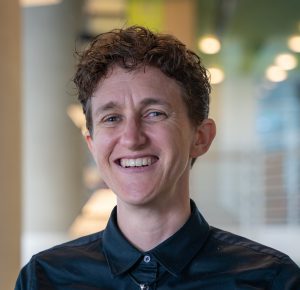
Rebecca Stahl, CFCC Executive Director
By Rebecca Stahl, CFCC Executive Director
My first experience as CFCC’s Deputy Director was participating in the Center’s annual symposium four days after I started. That day in April 2019 was an incredible opportunity to meet the people in Baltimore and beyond, who shared our vision to improve the lives of children and families. I have known that I wanted to focus on policy and advocacy since law school. After more than eight years practicing law, I was excited to join CFCC.
On March 8, I am taking the next major step in my career-long journey as a lawyer and healing professional focused on serving youth. I am leaving CFCC to become the interim executive director of Somatic Experiencing International, an organization on whose board I have served since 2018. Michele Hong will serve as interim executive director at CFCC while a full executive search occurs.
These past four years have been a time of deep learning and deep connection for me. They have given me the opportunity to reflect on my own work and the way different systems operate in society. CFCC has been the perfect place to navigate the challenges of recent years with compassion, care, and vision. While I cannot share everything that has happened, I want to reflect on some particular highlights.
My time at CFCC has been eye opening and connecting in wonderful ways. I have loved working with students who want to practice law from a more therapeutic and holistic standpoint than is often taught in traditional law school settings. Particularly as we transitioned to entirely virtual learning and everyone in the world was experiencing the intensity of the Covid pandemic, we could talk about the ways in which this trauma was impacting them as students and how it would impact them as professionals.
CFCC has long been a pipeline for the law school to engage directly and have an impact on our community through our collaboration with Baltimore City Public Schools and many other partners. I have been honored to work with members of the Maryland Judiciary and the Administrative Office of the Courts on projects involving therapeutic jurisprudence and issues related to trauma and adverse childhood experiences. A recent collaboration with the Family League of Baltimore has expanded our reach into the community. CFCC also gave me my first opportunity to testify on legislation, and I look forward to seeing how CFCC continues to engage in legislative advocacy moving forward.
When the law school resumed in-person learning and we were able to return to the office, we collaborated on several major events, including our first in-person symposium since 2019, and events co-hosted with the Maryland Child Alliance and the University of Baltimore School of Law Center for Criminal Justice Reform. With the help of Student Fellows, we created a Community Resource Guide for families in the Baltimore City community. The CFCC team will continue to explore innovative ways to serve as a hub for rethinking ways the legal system can better serve families and children while exploring approaches to help families avoid system interactions that can damage family integrity—such as the Truancy Court Program’s work to interrupt the school-to-prison pipeline.
Despite perpetual funding issues, a pandemic, and an increase in school shootings and other violence in our schools, the Truancy Court Program (TCP) team reaches out to students and families, works with them from a trauma-informed and restorative approach, and helps them navigate legal and administrative systems. Before coming to CFCC, I represented children in child welfare proceedings in Tucson, Arizona, and Los Angeles County, California. The TCP and its connection to youth was, therefore, a major factor that drew me to CFCC.
Finally, I have found a family at the University of Baltimore School of Law. I have had the honor to serve as staff advisor for OUTLaw and to guest lecture in a few law school classes. I am grateful to the law school administration and the larger University, particularly the Provost’s office and the University of Baltimore Foundation for supporting CFCC. And I am deeply grateful to CFCC’s staff and consultants. Our team is small but connected, and I could not ask for a better working environment than what we have at CFCC.
And of course, there are CFCC’s founding director, Barbara Babb, and its current faculty director, Shanta Trivedi. I have known Barbara for more than 14 years when we met at a conference of the Association of Family and Conciliation Courts. I was always drawn to CFCC’s work, and I have been honored to be able to be a part of this work. Since 2021, Shanta and I have worked together to grow the vision of where CFCC can be of most service in the world. While it is difficult to leave as that vision solidifies, I know CFCC is in great hands.
I am not someone who ever really leaves a place. I collect people and places and look forward to exploring ways to continue supporting the amazing work of CFCC in the future by working together to support children and families.